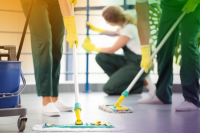Landlords - A guide to hiring the right tradespeople
One of the main responsibilities of any landlord is hiring tradesmen to work on their rental properties. There’s a wide range of work which might need to be done, from the big jobs like replacing a roof to smaller things like fixing a leaking sink. Landlords also have a further responsibility to their tenants, and have to make sure that the people going into rented properties know what they’re doing and can produce work of a high standard. So how do you find the best tradespeople?
Long term relationships are key
The worst case scenario would be having to search around for someone new to do work each time something goes wrong. The best strategy is to try to build a network of trusted professionals who can tackle all maintenance and emergency jobs in your properties. Often, the best way to get people is through personal recommendation. Use tradesmen who have worked on your family home, or have successfully completed jobs for friends and relatives. A good tradesman will often have their own contacts – so ask your heating engineer if they can recommend a carpenter, plasterer or electrician. Keep their details to hand so that you’re not scrabbling around for contact numbers when your tenant contacts you to tell you there’s water pouring through the ceiling.
Ensure appropriate certification is present
Another key thing to look for is a tradesperson with the right certificates and qualifications for the work they are doing. As a landlord, you take responsibility for the safety of your property. Particular care has to be taken with any work involving gas or electrics. It’s against the law to work with gas if you’re not listed on the Gas Safe register. For electrics, some work has to be done by a specially qualified individual, or signed off by one. Don’t assume that everyone listed on the internet as a heating engineer is qualified. Always check. Make sure that someone who has been registered in the past is still qualified to do the work at the time of the installation.
Access for work to tenant properties
Most tenants are cooperative and happy to have people coming into their home to do repair and maintenance work. If the work is routine in nature, it’s common courtesy to talk to your tenants first and ask them to let you know when would be convenient for them. In an emergency, tenants just want the problem fixed as soon as possible. Legally, you have to give 24 hours notice before someone wants to visit the property, but the more notice you can give the better. You can only send someone into the property without notice in a real emergency, such as a house fire or smell of gas.
Can’t the tenants hire workmen
It’s tempting to pass the responsibility for organising work to the tenant, but it’s really your job. Managing the process yourself guarantees that you get appropriate people for the work. It also lets you keep on top of prices and quotes rather than just being presented with the bill.





